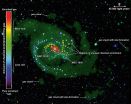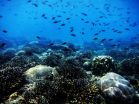(Press-News.org) A team of Australian and Spanish astronomers have caught a greedy galaxy gobbling on its neighbours and leaving crumbs of evidence about its dietary past.
Galaxies grow by churning loose gas from their surroundings into new stars, or by swallowing neighbouring galaxies whole. However, they normally leave very few traces of their cannibalistic habits.
A study published today in Monthly Notices of the Royal Astronomical Society (MNRAS) not only reveals a spiral galaxy devouring a nearby compact dwarf galaxy, but shows evidence of its past galactic snacks in unprecedented detail.
Australian Astronomical Observatory (AAO) and Macquarie University astrophysicist, Ángel R. López-Sánchez, and his collaborators have been studying the galaxy NGC 1512 to see if its chemical story matches its physical appearance.
The team of researchers used the unique capabilities of the 3.9-metre Anglo-Australian Telescope (AAT), near Coonabarabran, New South Wales, to measure the level of chemical enrichment in the gas across the entire face of NGC 1512.
Chemical enrichment occurs when stars churn the hydrogen and helium from the Big Bang into heavier elements through nuclear reactions at their cores. These new elements are released back into space when the stars die, enriching the surrounding gas with chemicals like oxygen, which the team measured.
"We were expecting to find fresh gas or gas enriched at the same level as that of the galaxy being consumed, but were surprised to find the gases were actually the remnants of galaxies swallowed earlier," Dr López-Sánchez said.
"The diffuse gas in the outer regions of NGC 1512 is not the pristine gas created in the Big Bang but is gas that has already been processed by previous generations of stars."
CSIRO's Australia Telescope Compact Array, a powerful 6-km diameter radio interferometer located in eastern Australia, was used to detect large amounts of cold hydrogen gas that extends way beyond the stellar disk of the spiral galaxy NGC 1512.
"The dense pockets of hydrogen gas in the outer disk of NGC 1512 accurately pin-point regions of active star formation", said CSIRO's Dr Baerbel Koribalski, a member of the research collaboration.
When this finding was examined in combination with radio and ultraviolet observations the scientists concluded that the rich gas being processed into new stars did not come from the inner regions of the galaxy either. Instead, the gas was likely absorbed by the galaxy over its lifetime as NGC 1512 accreted other, smaller galaxies around it.
Dr Tobias Westmeier, from the International Centre for Radio Astronomy Research in Perth, said that while galaxy cannibalism has been known for many years, this is the first time that it has been observed in such fine detail.
"By using observations from both ground and space based telescopes we were able to piece together a detailed history for this galaxy and better understand how interactions and mergers with other galaxies have affected its evolution and the rate at which it formed stars," he said.
The team's successful and novel approach to investigating how galaxies grow is being used in a new program to further refine the best models of galaxy evolution.
For this work the astronomers used spectroscopic data from the AAT at Siding Spring Observatory in Australia to measure the chemical distribution around the galaxies. They identified the diffuse gas around the dual galaxy system using Australian Telescope Compact Array (ATCA) radio observations. In addition, they identified regions of new star formation with data from the Galaxy Evolution Explorer (GALEX) orbiting space telescope.
"The unique combination of these data provide a very powerful tool to disentangle the nature and evolution of galaxies," said Dr López-Sánchez.
"We will observe several more galaxies using the same proven techniques to improve our understanding of the past behaviour of galaxies in the local Universe."
INFORMATION:
Images:
The below images are available in highest resolution at: https://www.dropbox.com/sh/s9q16b64l6h0075/AAAf6ocwSavAUjLew90j1L_Fa?dl=0
Publication details:
Á. R. López-Sánchez, T. Westmeier, C. Esteban, and B. S. Koribalski."Ionized gas in the XUV disc of the NGC1512/1510 system". Published in Monthly Notices of the Royal Astronomical Society (MNRAS) through Oxford University Press. http://mnras.oxfordjournals.org/lookup/doi/10.1093/mnras/stv703 (available after 9am AEST Thursday May 21)
Science Team contacts:
Dr Ángel R. López-Sánchez
Australian Astronomical Observatory / Macquarie University
Ph: +61 2 9372 4898 M: +61 406 265 917 E: angel.lopez-sanchez@aao.gov.au
Dr Tobias Westmeier
The International Centre for Radio Astronomy Research / University of Western Australia
Ph: +61 8 6488 4592 E: tobias.westmeier@icrar.org
Dr Baerbel Koribalski
Commonwealth Scientific and Industrial Research Organisation (CSIRO)
Ph: +61 2 9372 4361 M: +61 450 624 954 E: baerbel.koribalski@csiro.au
Press Officer contacts:
Dr Amanda Bauer
Australian Astronomical Observatory (AAO)
Ph: +61 2 9372 4852 M: +61 447 029 368 E: amanda.bauer@aao.gov.au
Pete Wheeler
The International Centre for Radio Astronomy Research (ICRAR)
Ph: +61 8 6488 7758 M: +61 0423 982 018 E: pete.wheeler@icrar.org
The success of corals that adapt to survive in the world's hottest sea could contribute to their demise through global warming, according to new research.
Researchers from the University of Southampton and the New York University Abu Dhabi found that local adaptation to high salinity levels in the southern Persian/Arabian Gulf (PAG) may prevent coral escaping their fate, as they lose their superior heat tolerance in waters with normal salinity levels.
The research is published this week in The ISME Journal, a world leading publication platform for ecological research, ...
Malaria is a cruel and disabling disease that targets victims of all ages. Even now, it is estimated to kill one child every minute. Recent progress in halting the spread of the disease has hinged on the use of insecticide-treated bed nets and spraying programmes that target the insect that spreads the disease, the African malaria mosquito (Anopheles gambiae). However, the insects are fighting back, developing resistance to insecticides such as pyrethroid that control their numbers, forcing Brian Foy and Jacob Meyers from Colorado State University to think of alternative ...
Report shows 38 MPs have accepted over £60,000 of industry hospitality since 2010
More than half of these MPs are from constituencies where the number of smoking related deaths exceeds the national average
20 of the 38 MPs who accepted hospitality voted against plain packaging
An investigation by The BMJ today asks to what extent is the tobacco industry able to reach out and influence parliamentarians?
It shows that since 2010, 38 MPs -- 29 Conservatives, eight Labour, and one independent -- have accepted over £60,000 worth of tobacco industry hospitality, ...
Cold weather kills 20 times as many people as hot weather, according to an international study analysing over 74 million deaths in 384 locations across 13 countries [1]. The findings, published in The Lancet, also reveal that deaths due to moderately hot or cold weather substantially exceed those resulting from extreme heat waves or cold spells.
"It's often assumed that extreme weather causes the majority of deaths, with most previous research focusing on the effects of extreme heat waves," says lead author Dr Antonio Gasparrini from the London School of Hygiene & Tropical ...
ATS 2015, DENVER -- Chronic obstructive pulmonary disease, or COPD, is associated with increased risk of dying from a cardiovascular disease such as heart failure or a heart attack, as well as diseases not associated with the heart. However, COPD is not by itself associated with increased likelihood of having a stroke or a systemic embolism, according to a new research study.
Researchers from Duke University and the Mayo Clinic reached this conclusion after analyzing data from a large randomized trial of patients with atrial fibrillation, a condition that produces ...
MINNEAPOLIS - People with depression may be more likely to develop Parkinson's disease, according to a large study published in the May 20, 2015, online issue of Neurology®, the medical journal of the American Academy of Neurology.
"We saw this link between depression and Parkinson's disease during over a timespan of more than two decades, so depression may be a very early symptom of Parkinson's disease or a risk factor for the disease," said study author Peter Nordström, PhD, at Umeå University in Umeå, Sweden.
The researchers also examined siblings, ...
DALLAS, May 20, 2015 -- Group behavioral therapy that encouraged walking at home significantly improved and prevented mobility loss among patients with clogged arteries in the legs, according to research in the Journal of the American Heart Association.
Known as peripheral artery disease (PAD), clogged arteries in the legs can cause pain and fatigue while walking. Maintaining mobility is integral to preserving functional independence, social interactions and daily activities.
Although studies have shown that supervised exercise on a treadmill improves walking endurance ...
DALLAS, May 20, 2015 -- Large waistline, cholesterol disorders and other metabolic abnormalities may increase the risk of cardiovascular disease more among black women than among white women, according to new research in Journal of the American Heart Association.
Previous studies have focused primarily on white participants and found that obesity without a clustering of at least three metabolic disorders (metabolic syndrome) was not associated with increased cardiovascular disease risk. The metabolic abnormalities included in the definition of the metabolic syndrome are ...
WEST LAFAYETTE, Ind. - Purdue University research shows that a small amount of nicotinoid pesticide substantially weakens termites' ability to fight off fungal diseases, a finding that could lead to more effective methods of pest control.
The study also provides clues into termites' robust defense systems and how nicotinoids affect social insects.
A team led by Michael Scharf, the O.W. Rollins/Orkin Chair and professor of entomology, found that a sublethal dose of imidacloprid knocked out key microbes in the termite gut and suppressed the social hygiene habits that ...
Rolf Mueller, an associate professor of mechanical engineering in the College of Engineering at Virginia Tech, has developed a prototype of a dynamic sonar system inspired by horseshoe bats.
The prototype was presented Wednesday (May 20) at the Acoustical Society of America meeting in Pittsburgh, Pennsylvania. The principles used in its design could eventually lead to sonar systems much more effective than the best arrays available today.
Because bats use a form of biological sonar called echolocation to navigate and hunt in the dark, they are natural models for man-made ...


